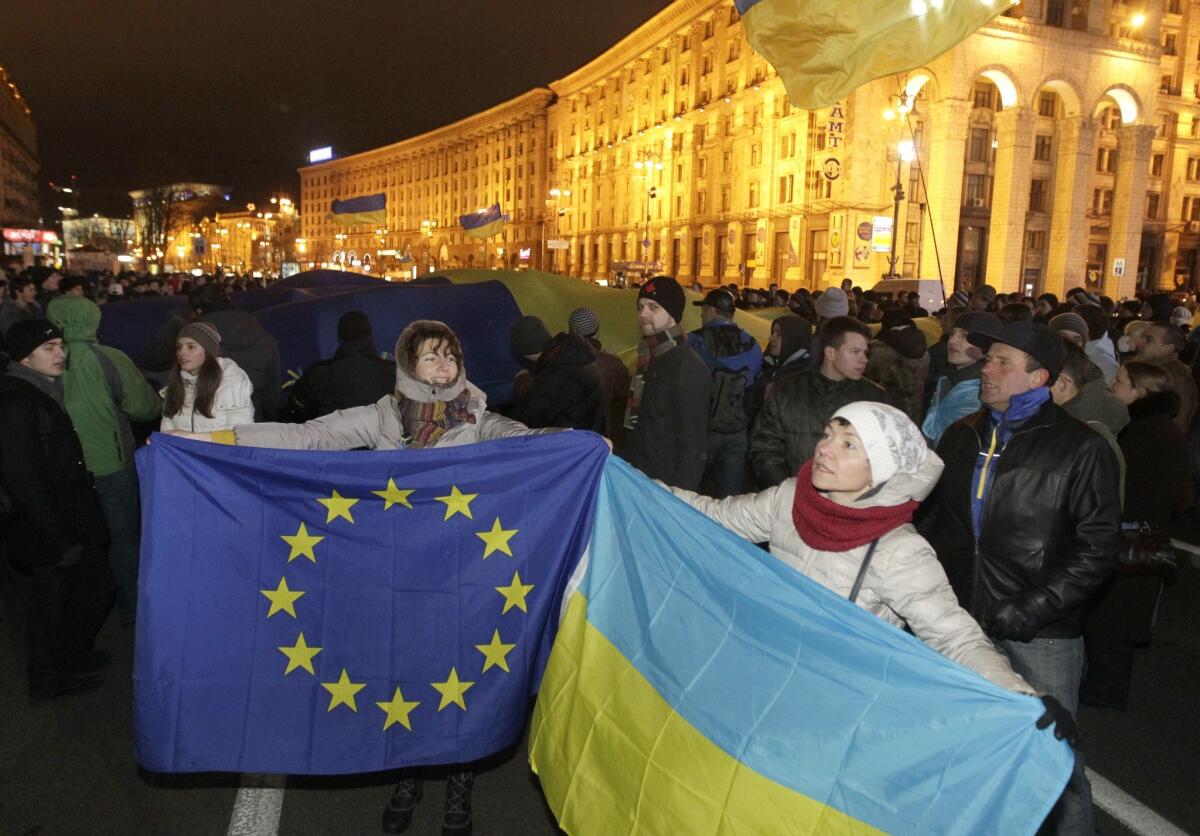Why Ukraine is staying in Russia’s orbit instead of turning West

The European Union economy is six times bigger than that of the post-Soviet Commonwealth of Independent States, and the average EU citizen earns more than three times as much as a counterpart in the eastern alliance.
Despite predicted short-term difficulties competing with the likes of Germany and Britain, more than 60% of Ukrainians wanted to seal a trade and association agreement with the Western European bloc.
Even some Ukrainian oligarchs who scooped up lucrative state assets from the communist era were said to have favored a pivot toward Brussels for the rule of law and stability that EU association would have brought to an economy now vulnerable to official expropriation and corruption.
So, why, many Ukrainians and those watching from afar wonder, has President Viktor Yanukovich bucked the Eastern European trend toward Western alignment to remain in Moscow’s domineering orbit?
Like a loveless but enduring marriage, Russia and Ukraine have too much historical baggage and economic interdependence to separate.
Had Kiev decided to go through with its plan to turn to the European Union for its future, the political jilting of Moscow would have surely provoked recriminations and retaliation. Ukraine has already seen a glimpse of what was at risk with Moscow’s barriers to steel and chocolate that have cost Ukraine $6.5 billion this year, Prime Minister Mykola Azarov said Sunday in explaining his nation’s retreat from the EU.
Still, Yanukovich surprised and angered many of his countrymen when he announced that Ukraine was formally suspending talks with the EU and wouldn’t be signing an association deal at a summit in the Lithuanian capital, Vilnius, on Friday.
Ukraine, in a fifth consecutive year of economic recession, is reliant on Moscow for gas imports and vulnerable to Russian leaders’ hints of generous discounts within the customs union that Russian President Vladimir Putin has created “as one of his big legacy projects,” said Andrew Weiss, a former Clinton administration advisor on the former Soviet Union now with the Carnegie Endowment for International Peace.
“In parallel, what the EU has come up with is a kind of partnership on the cheap,” Weiss said of the documents that were to have been signed at Vilnius, a distant prelude to actual membership in the 28-nation bloc. “The EU didn’t put much on the table to cushion the blow of Russia’s reaction, and they seem to have miscalculated the scale of Russia’s opposition.”
Moscow’s attitude toward Ukraine is condescending and heavy-handed, Weiss said, and Putin’s fixation on keeping former Soviet republics tethered to Moscow “defies rational cost-benefit analysis.” Most of the ex-Soviet states in the loose trade alliance with Russia are economic basket cases that are a drain on Moscow’s treasury, Weiss said.
Steven Pifer, a former U.S. ambassador to Ukraine now with the Brookings Institution, sees Putin’s quest to keep Ukraine in its sphere of influence as “trying to recapture something that [harks] back to Moscow’s status as a great power.”
Ukraine’s future would clearly be more promising in alignment with the EU, Pifer said, and even Yanukovich has said he remains supportive of eventual European integration.
Yanukovich said late Tuesday, however, that the timing was not yet right.
“As soon as we reach a level that will be comfortable for us and when it answers our interests and when we agree on acceptable conditions, then we will talk about signing,” he said, according to an advance transcript of a television interview posted on his website.
Pifer holds out the prospect that Ukraine’s decision to shelve EU association was a tactical move. One condition set by EU officials for Ukraine to show its commitment to democratic reforms was that Orange Revolution leader, former prime minister and Yanukovich nemesis Yulia Tymoshenko be freed from imprisonment on corruption charges widely seen as politically motivated.
“It wasn’t clear until Thursday whether Ukraine had done enough in terms of EU criteria to get an agreement signed,” Pifer said, referring to Ukrainian lawmakers’ refusal last week to free Tymoshenko so she could seek medical treatment abroad. That uncertainty might have moved Yanukovich to evade embarrassment in Vilnius by deciding to “pause association, rather than be rejected.”
Others see Yanukovich as an opportunist with his eye on one thing only: getting reelected in early 2015.
Opting for closer ties with Moscow gratifies many Russian speakers who make up a quarter of the country’s 45 million population and much of Yanukovich’s political base, said Walter Connor, former director of Soviet and Eastern Europe studies at the U.S. State Department’s Foreign Service Institute.
“Russia still has the whip hand with respect to gas and energy in the bilateral relationship with Ukraine,” said Connor, a professor of international studies at Boston University.
“It looks like Ukraine has missed an opportunity to link itself closer to trade and the general Europeanizing influence that would come with an agreement with the EU,” he said. “But that doesn’t mean these possibilities are lost forever.”
ALSO:U.S. looks to bypass Karzai on Afghanistan security deal
Egypt police fire water cannons on protesters testing new law
France to send troops to Central African Republic as violence spreads
A foreign correspondent for 25 years, Carol J. Williams traveled to and reported from more than 80 countries in Europe, Asia, the Middle East and Latin America.
More to Read
Sign up for Essential California
The most important California stories and recommendations in your inbox every morning.
You may occasionally receive promotional content from the Los Angeles Times.











